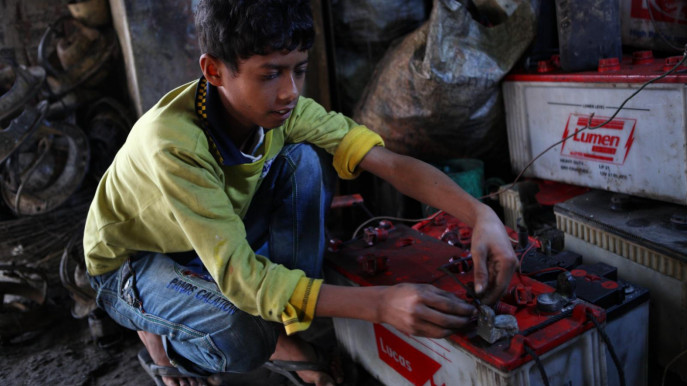59 areas heavily polluted by lead battery recycling

Dhaka, 17 October, 2020: Research finds 59 areas in 147 recycling zones in six divisional headquarters with heavy lead contamination

More than one-third of the lead-acid battery recycling factories across the country are seriously polluting the environment, says a research.
The research conducted by the Environment and Social Development Organization (ESDO) indicates that of the 147 recycling zones in the divisional headquarters, 59 areas were found lead polluted.
According to health experts, indiscriminate recycling of used lead-acid batteries contaminates soil and water with toxic substances, posing long-term health risks.
Though only five recycling factories have received environmental certificates from the Department of Environment (DoE) thus far, the DoE estimates that there are currently around 250 units across the country.
The factories dismantle used batteries and collect reusable items such as lead and acid. They melt the lead and sell it to retailers. During this process, vaporised lead contaminates the air while the discarded acid pollutes the soil.
Lead-acid batteries are the earliest types of rechargeable batteries, which can supply high surge currents. This feature, along with their low cost, makes them attractive for use in motor vehicles. In Bangladesh, "Used Lead Acid Batteries (ULAB)" can be reused in some sectors.
According to the ESDO research conducted during March-August of this year, both formal and informal recycling of the ULAB are responsible for polluting areas adjacent to factories.
ESDO Executive Director Siddika Sultana said, "The government should take steps to ensure that recycling of both commercial and non-commercial lead-acid batteries is done in a safer and environmentally friendly way. And child labour in this sector must be checked. Lead pollution can cause serious damage to the nervous systems of the children working in the factories."
Unicef and Washington University's Institute for Health Metrics and Evaluation (IHME) jointly published a research report in July this year.
The report titled "The Toxic Truth: Children's Exposure to Lead Pollution Undermines a Generation of Future Potential" said more than 3.50 crore children are at health risk from lead contamination.
The report identified battery recycling in open air and adjacent to localities as one of the major factors behind lead exposure. It said that such hazardous activities put both adults and children at substantial health risks.
According to IHME data, Bangladesh stands fourth among the countries that have higher mortalities associated with lead-poisoning. People in the country have elevated blood lead levels – 6.83 microgram per decilitre (µg/dL) on average, securing it 11th place globally.
According to an icddr,b survey, nearly half of the lead used in industry comes from used lead-acid batteries recycled by smaller factories. One of the matters causing concern is that while the government has long-term plans to ensure cent percent electricity coverage, lead-acid batteries still feature on the top of the list of rechargeable energy sources.
In Bangladesh, lead acid batteries are used in motor vehicles, solar energy production, power-run rickshaws and telecommunications, whereas 65-75% of the batteries are used in electric rickshaws alone.
ESDO calls for safe and environmentally friendly lead use and recycling in the commercial and non-commercial sectors. The NGO also urged the government to formulate clear policies in this regard.
ESDO further said that appropriate legislation and environmentally sound management are required to combat widespread potential risks and environment pollution. In Bangladesh, the ULAB-related restrictions should go through evaluation and scrutiny, with the application of relevant laws in the process.
Read More
.

